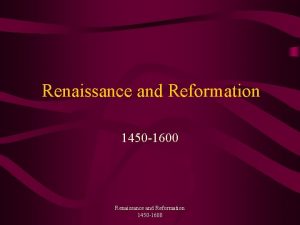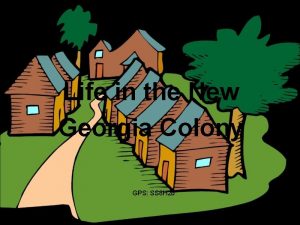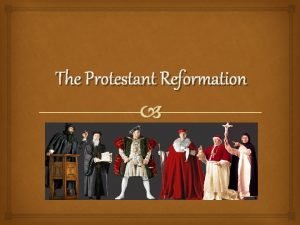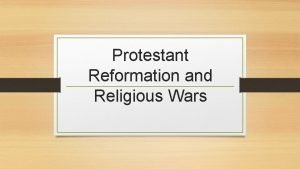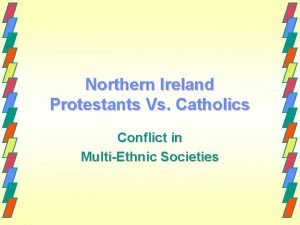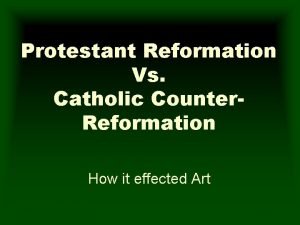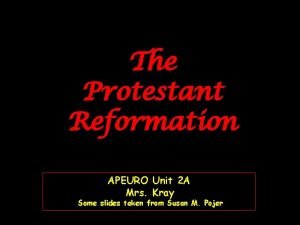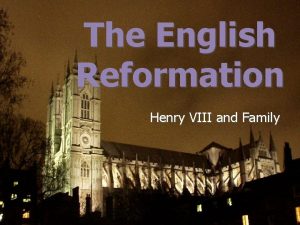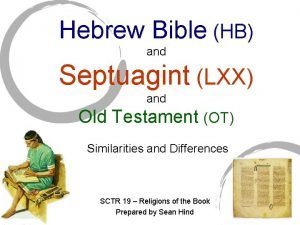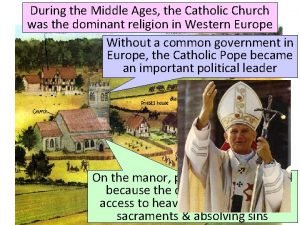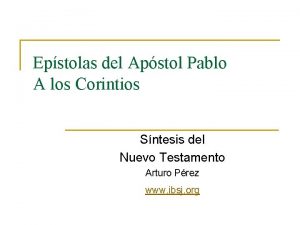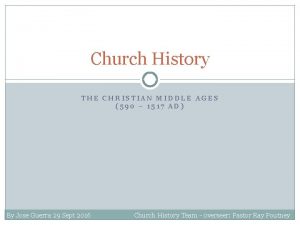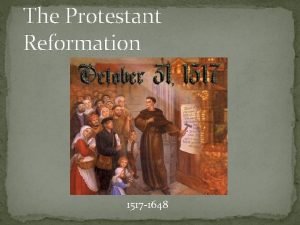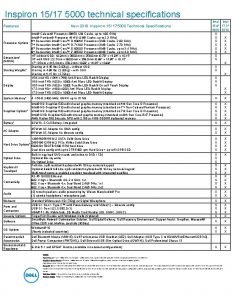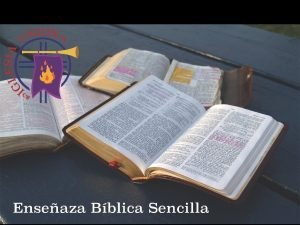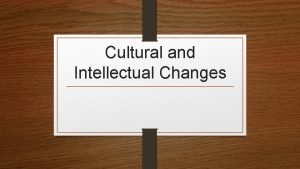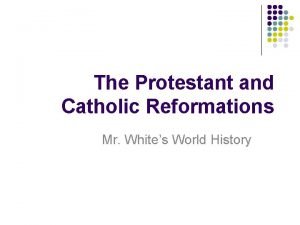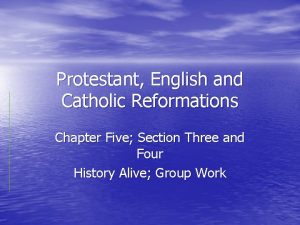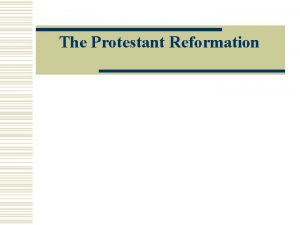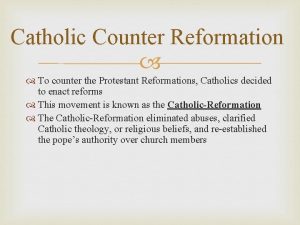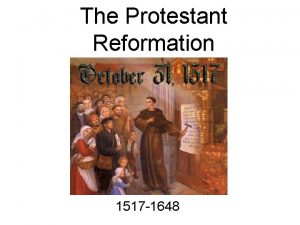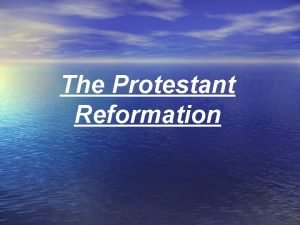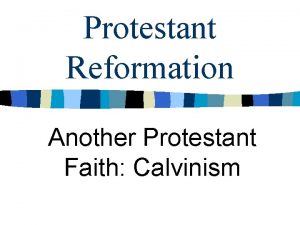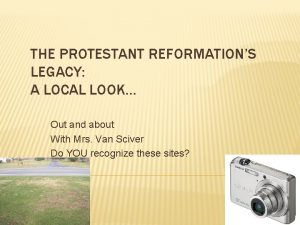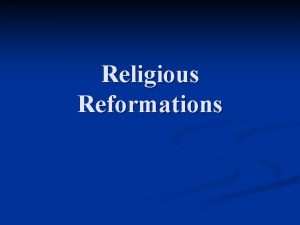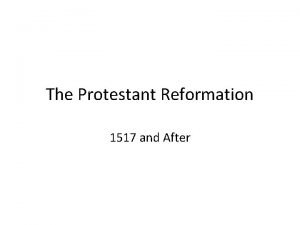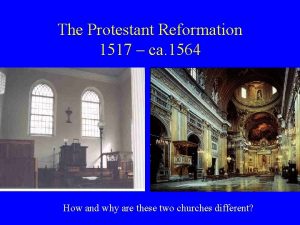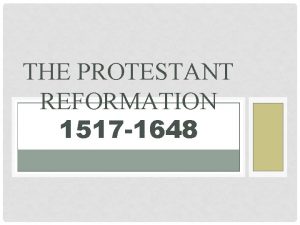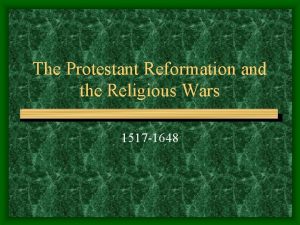The Reformations The Protestant and Catholic Reformations 1517
















- Slides: 16

The Reformations The Protestant and Catholic Reformations, 1517 -1555

Agenda 1. Questions about the Renaissance test? 2. Opening Question/Roll 3. Discussion: The Reformations-Their Nature and Martin Luther 4. Closing Question 5. HW Reminder: as per the agenda on khanlearning. weebly. com

Opening question • What were the factors that led to the beginning of the Protestant Reformation? • https: //www. youtube. com/watch? v=Z 4 RNYQscm 0 w


Reformation? Reformations? • Protestant reformation a watershed in Western civilization • Many religious movements in 16 th century = reformation (Re-formation (make over), or Reformation (make better)? ) • Protestants differ as sharply among selves as with Rome • Reformers initially do not see selves as anti-Catholic

Popular Religious Movements and Criticism of the Church • Reformation could not have happened without the earlier challenges to the Church’s authority: • • Avignon papacy The Great Schism The Conciliar Period The Renaissance papacy • Lay criticism of the church was growing • Many sought a more egalitarian church Copyright © 2010 Pearson Education, Inc. , Upper Saddle River, NJ 07458. All rights reserved.

Lay Control Over Religious Life • The benefice system, the sale of religious office to the highest bidder, was collapsing. • Communities were loudly protesting financial and spiritual abuses, such as the sale of indulgences. • City governments were endowing preacherships. • Magistrates were restricting the growth of ecclesiastical properties and clerical privileges. Copyright © 2010 Pearson Education, Inc. , Upper Saddle River, NJ 07458. All rights reserved.

“Magisterial Reformers”: Luther and Calvin • Magisterial = “Master”, “Teacher” • Martin Luther (1483 -1546) • John Calvin (1509 -1564)


Martin Luther (1483 -1546) • Born in small, N German town to miner family • Local education & University of Erfurt • Plans to go into law, does not • Augustinian monk • Visits Rome, confirms suspicions • Begins teaching at University of Wittenberg


Luther’s Path to Reform 1. Influenced by Christian humanism and contemporary criticism of the church 2. Highly sensitive personality • • Prone to deep doubts and pessimism Could not convince himself that he was worthy of God, not that actions on his part could benefit 3. “Justification by Faith” • Concluded God does not demand charitable acts and religious ceremonies, but just faith in Jesus Christ as perfect righteousness. Good works expected, but did not earn one salvation.

https: //www. youtube. com/watch? v=9 Ikqni. F 8 AA 8

“So bald der Gulden im Becken klingt/Im huy die Seel im Himel springt. ”

Indulgences • Remission of temporal punishment in purgatory • Indulgence fairly typical aspect of medieval Catholicism = Became bloated • Johan Tetzel (1516), master indulgence salesman • Selling indulgences on behalf of Jubilee, rebuilding of St. Peter’s • Luther has two problems with indulgences: • Smacks of “good works” • Transfers German money through Austrian bankers to Rome • Ninety-five Theses (31 October 1517) • Probably not Luther, NOT a defiant act • Church tries to discipline through the order • Humanists rally

Reformation: Day 2
 What is the difference between protestant and catholic
What is the difference between protestant and catholic Roman catholic and protestant
Roman catholic and protestant Protestant church hierarchy
Protestant church hierarchy Beliefs of protestants
Beliefs of protestants Protestant vs catholic
Protestant vs catholic Catholic reformation vs counter reformation
Catholic reformation vs counter reformation Protestant vs catholic war
Protestant vs catholic war Simony ap euro
Simony ap euro Protestant vs catholic war
Protestant vs catholic war Lexaria bioscience corp
Lexaria bioscience corp Lutheran vs catholic
Lutheran vs catholic Protest reformation 1517 1648
Protest reformation 1517 1648 Primera de corintios 1517
Primera de corintios 1517 The medieval church (590-1517 ce)
The medieval church (590-1517 ce) Calvinism map
Calvinism map Dell inspiron 1517
Dell inspiron 1517 31 octubre 1517
31 octubre 1517
